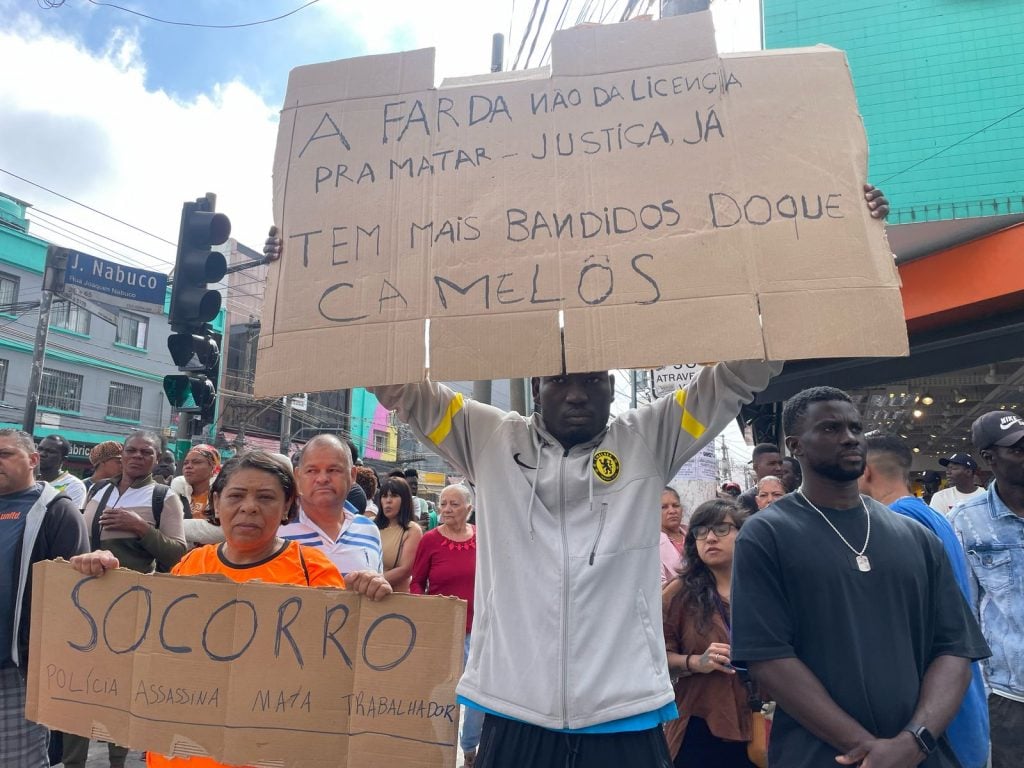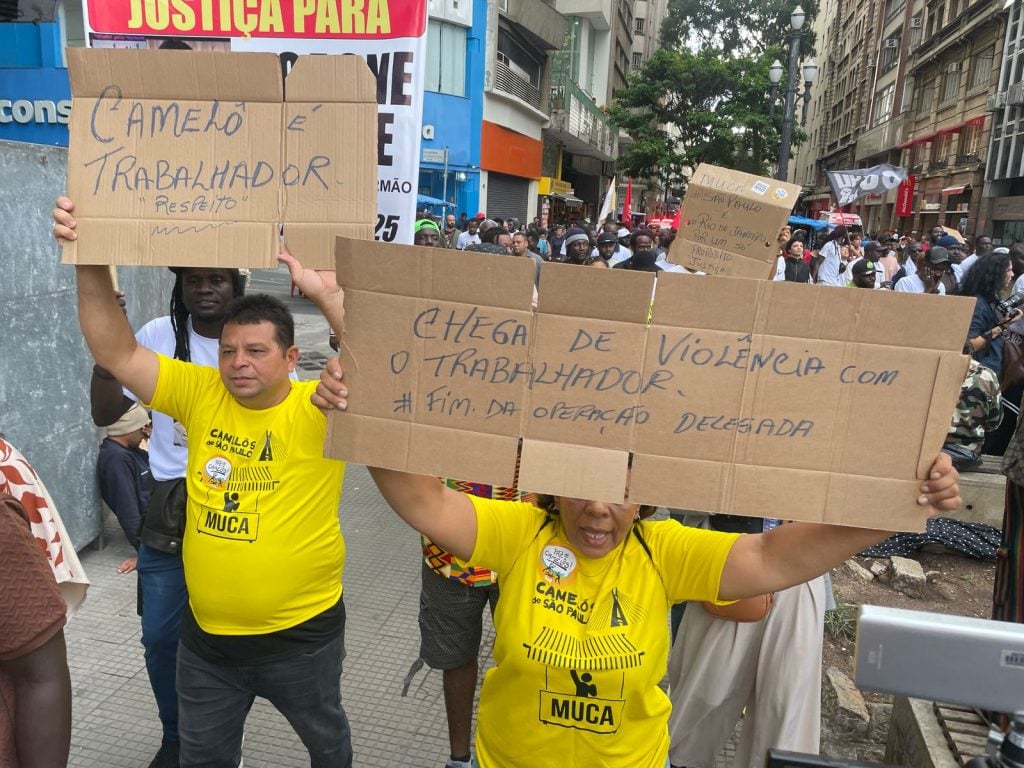On Monday afternoon (14), hundreds of people marched through downtown São Paulo demanding justice for Senegalese worker Ngange Mbaye, yet another victim of the Military Police (PM).
The demonstrators, most of them Senegalese, wore T-shirts printed with the face of Mbaye, a street vendor who was beaten and murdered by the Military Police of São Paulo on Friday afternoon (11), in an area known as Brás, located at the city’s central region.
“If he had been arrested, I would have taken care of him, brought him food. If his foot had been broken, I could have taken him to the hospital. But policemen killed him,” laments Soda Diop, a Senegalese woman known as Mama. For almost two decades, she has been helping newly arrived immigrants in the city of São Paulo.
“They don’t have the right to kill us. They have all the possibilities for letting us live,” protests Mama, pointing out that the police have the resources to carry out the approach without killing anyone.
Before being shot in the chest, Mbaye’s goods were seized and the agents beat him.
“It wasn’t an accident. It was a situation that had already been announced,” says José Pedro dos Santos Neto, a street vendor. He and other Brazilians who work on the city’s streets have joined Senegalese migrants in denouncing police violence against these workers.
Neto says that, before Ngage Mbaye’s murder, street vendors had contacted São Paulo City Hall, the Labor Prosecutor’s Office and the police ombudsman’s office to denounce police violence. “We had already warned them in no uncertain terms that the worst was going to happen. And it’s sad to say that if nothing is done now, history will repeat itself,” she said.

City councilor Luana Alves (Socialism and Freedom Party) pointed out that the crime against the Senegalese man is a consequence of the so-called “delegated operations”, agreements between the City Hall and the São Paulo State Government allowing police officers to reinforce policing in the city during their days off.
These operations focus on street vendors, popularly known in Brazil as “ambulantes”. “There is no public policy to regulate street vending in São Paulo,” the politician emphasized.
At the demonstration, university professor Mamou Sop Ndiaye recalled another case of violence against a Senegalese migrant in the city. A year ago, Serigne Mourtalla Mbaye, known as Talla, fell from the sixth floor after police action in the building where he lived on Guaianases Street, downtown São Paulo.
“We are here to say that killing Senegalese is not normal. It can’t be normalized. Police violence against Black people is known in all its variations, but it’s on the verge of a pandemic that we need to eliminate,” he said.
At the protest, demonstrators were selling T-shirts with Ngange Mbaye’s image for BRL 50 (US$ 8,5) to raise funds to help the victim’s family. The street vendor had a wife who is now seven months pregnant. According to the family’s lawyer, Adriano Santos, who is also a member of the Public Security Commission of the Brazilian Bar Association (OAB, in Portuguese), they were going to have a baby shower last Sunday (13).

Parliamentarians barred from meeting at city hall
The demonstrators walked from República Square to the city hall building, where representatives of the Senegalese community attended a meeting with the deputy mayor of São Paulo, Colonel Mello Araujo (Liberal Party). Among those at the meeting was Babacar Ba, Senegal’s honorary consul in São Paulo.
Margarida Bernardina dos Santos Ramos, from the Street Vendors’ Forum and the Street Vendors’ Struggle Movement, the police ombudsman of São Paulo’s Military Police of São Paulo, Mauro Cesari, city councilor Luana Alves and the co-deputy of the Feminist Caucus, Simone Nascimento (Socialism and Freedom Party) were barred from the meeting.
“What happened today is unbelievable. They didn’t allow parliamentarians or me, from civil society, to enter. We don’t know what they discussed there,” protested Ramos.
At the end of the meeting, Babacar Ba, in an interview with BdF, said another meeting was scheduled for Tuesday (15).
“We’re going to go back to the city hall building so that we can, together with other street vendors, whether Senegalese, Congolese, Ivorian or Brazilian, discuss how to legalize the work of street vendors,” he said.
Body will be taken to Senegal
According to Alves, the Senegalese consulate will guarantee the transfer of Ngange Mbaye’s body to his home country.
“There is a religious issue when it is a Senegalese citizen killed in a violent situation, so the Senegalese consulate supports the body’s transfer,” she explained. “The situation has been resolved, although I think the Brazilian government should cover the Senegalese consulate’s expenses,” she suggests.
The parliamentarian points out that the Brazilian state should also take the necessary measures to compensate the victim’s relatives and hold the city of São Paulo responsible.
Attending the demonstration, actress and activist Mariama Bah called on the federal government to pay attention to the issues African immigrants face. “This was on the agenda of the National Immigration Conference [held in November 2024]. Public policies that we don’t have led to these tragedies, which are foretold. Tragedies that could have been prevented with other measures,” she says.
For her, the Brazilian federal government, the city and the state of São Paulo should both be held responsible for the street vendor’s death. “We need our rights to be guaranteed and, yes, they need reparations for the young man’s family. That’s our goal. It’s a struggle and it’s urgent.”




